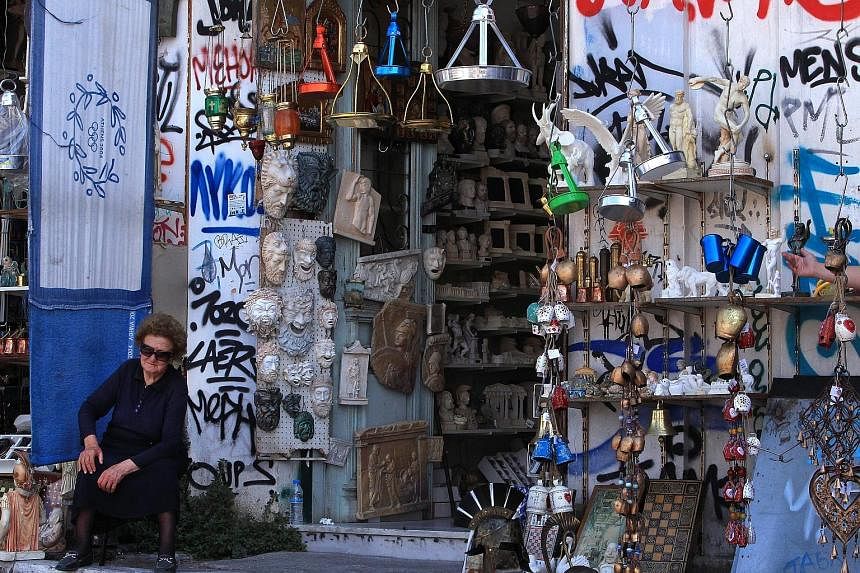ATHENS - Ms Dorothea Lambros stood outside a HSBC branch in central Athens last Friday, an envelope stuffed with cash in one hand and a €38,000 (S$57,600) cashier's cheque in the other.
She was a few minutes too late to make her deposit at the London-based bank, but she was too scared to take her life savings back to her Greek bank. She worried that it would not survive the weekend.
"I don't know what happens on Monday," said Ms Lambros, a 58-year-old government employee.
Nobody does. Every shifting deadline, every last-gasp effort has built up to this: A nation that went to sleep last Friday not knowing what today will bring. A deal or more brinkmanship. Shuttered banks and empty cash machines, or a few more days of euros in their pockets and drachmas in their past - and maybe their future.
On a street corner, a performance artist burned what he said were his last euros. Nearby, an Afghan beggar joked about how he should have gone to Sweden instead.
And in his neighbourhood restaurant, Mr Panagis Vourloumis, a 78-year-old investment banker and survivor of coups, dictators and communists, leaned forward and laid his worries on the table.
"We thought we had escaped the past, that we were a normal country now," he said. "But instead, we are living day to day. This, today now, is the worst I have ever seen."
For the Greeks, the fear is that today will be deja vu, a return to a past not that distant. Before the euro replaced the drachma in 2002, the Greeks were already a European bete noire, their currency mostly trapped inside their nation, where cash was king and cheques a novelty.
Since December, Greeks have been preparing for a weekend such as this, pulling more than €30 billion out of banks.
Week after week, the Bank of Greece borrowed banknotes from the rest of the continent to meet this hoarding of the one asset Greeks still trust: cold, hard cash.
Its liabilities to the rest of the euro area for the excess physical cash it has had to put into circulation quadrupled between December and April, the last month for which there is available data.
Without access to capital markets, Greek lenders have to rely on almost €86 billion of Emergency Liquidity Assistance (ELA) to stay afloat, subject to weekly boosts by the European Central Bank (ECB).
This time, it did not last a week. Last Friday, the ceiling of the so-called ELA was raised by €1.8 billion, just a couple of days after a €1.1 billion injection.
Today, the banks will be back, asking for more. Greek Prime Minister Alexis Tsipras was to spend his weekend coming up with a proposal to take to a showdown with euro area leaders today. A deal today is key.
The bailout agreement that has kept Greece from defaulting expires on June 30. That is the day Greece owes about €1.5 billion to the International Monetary Fund.
In an interview published last Saturday in Brussels-based l'Echo newspaper, Greek Finance Minister Yanis Varoufakis warned that the ruling Syriza party could be replaced by neo-Nazis if Greece ends up defaulting and leaving the euro.
Without at least an understanding among the political chiefs, Greek banks will reach the limits of their available collateral for more ECB aid.
"How did we end up like this? How did we become beggars? Defaulters? Everyone says we owe money," said Metropolitan Anthimos, bishop of Thessaloniki, Greece's second-biggest city, in his Sunday sermon broadcast live on state television. "If there's no progress tomorrow, bank shutters will remain closed on Tuesday," he told his flock.
This is not how it was supposed to end. So sure were Greeks of the permanence of the euro that when they minted their own €1 coin, they paid homage to a fifth-century drachma, among the world's oldest currencies.
Before the European project, Greece had spent decades in turmoil. Since the Nazi occupation during World War II - still an irritant during 21st-century bailout talks - it has seen a civil war, a military junta, a tussle between communists and anti-communists and, in the 1980s, an inflation rate of over 20 per cent.
Greece joined a precursor to what became the European Union in 1981, allowing it, finally, full access to international debt markets.
"There was a general sense of euphoria - you could get a job with the government, real estate prices kept going up," said Mr Vourloumis, who has run banks and telecommunications companies. "And then, with the European debt crisis, the whole thing was revealed - our economy was built on protectionism, on borrowed money."
BLOOMBERG

